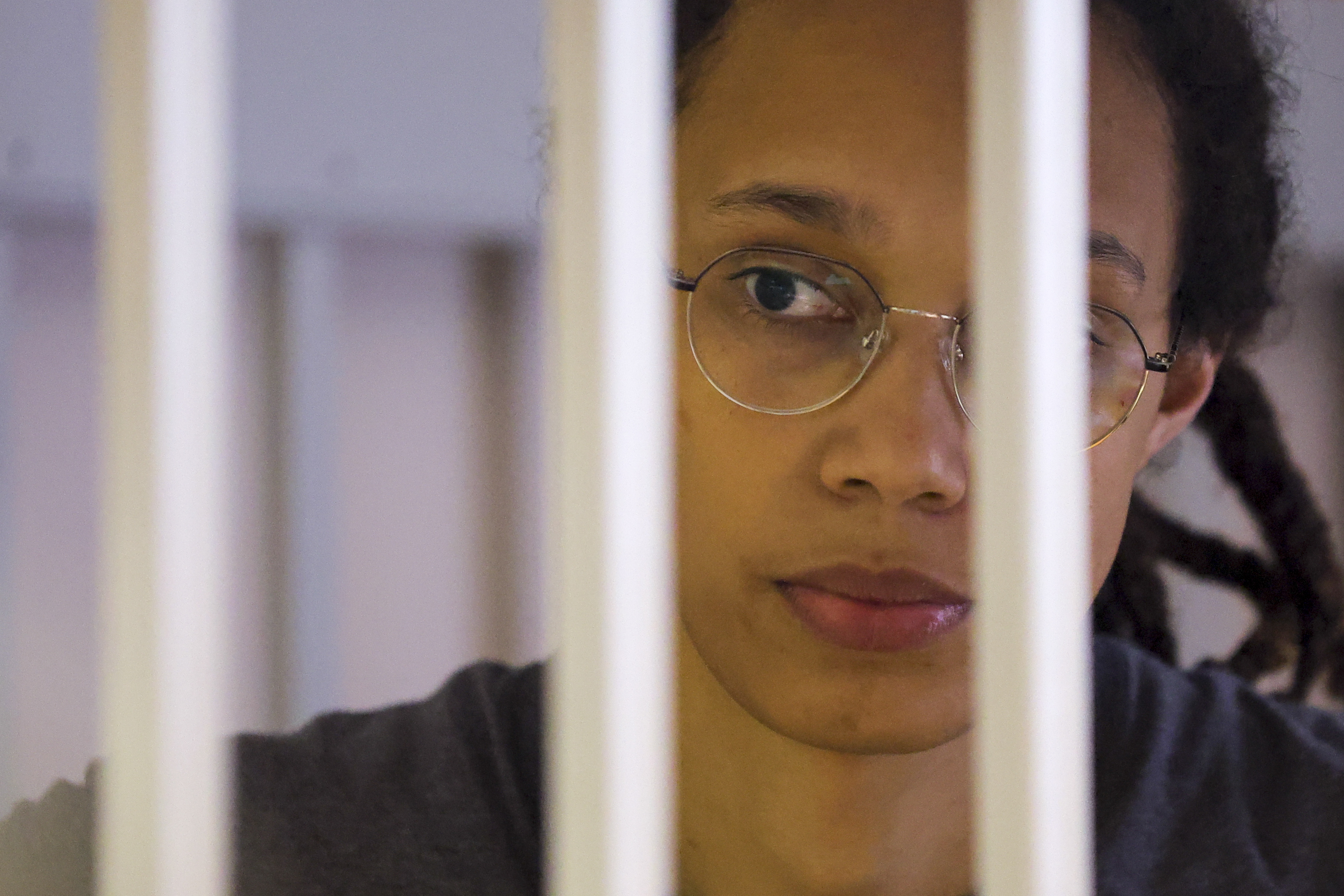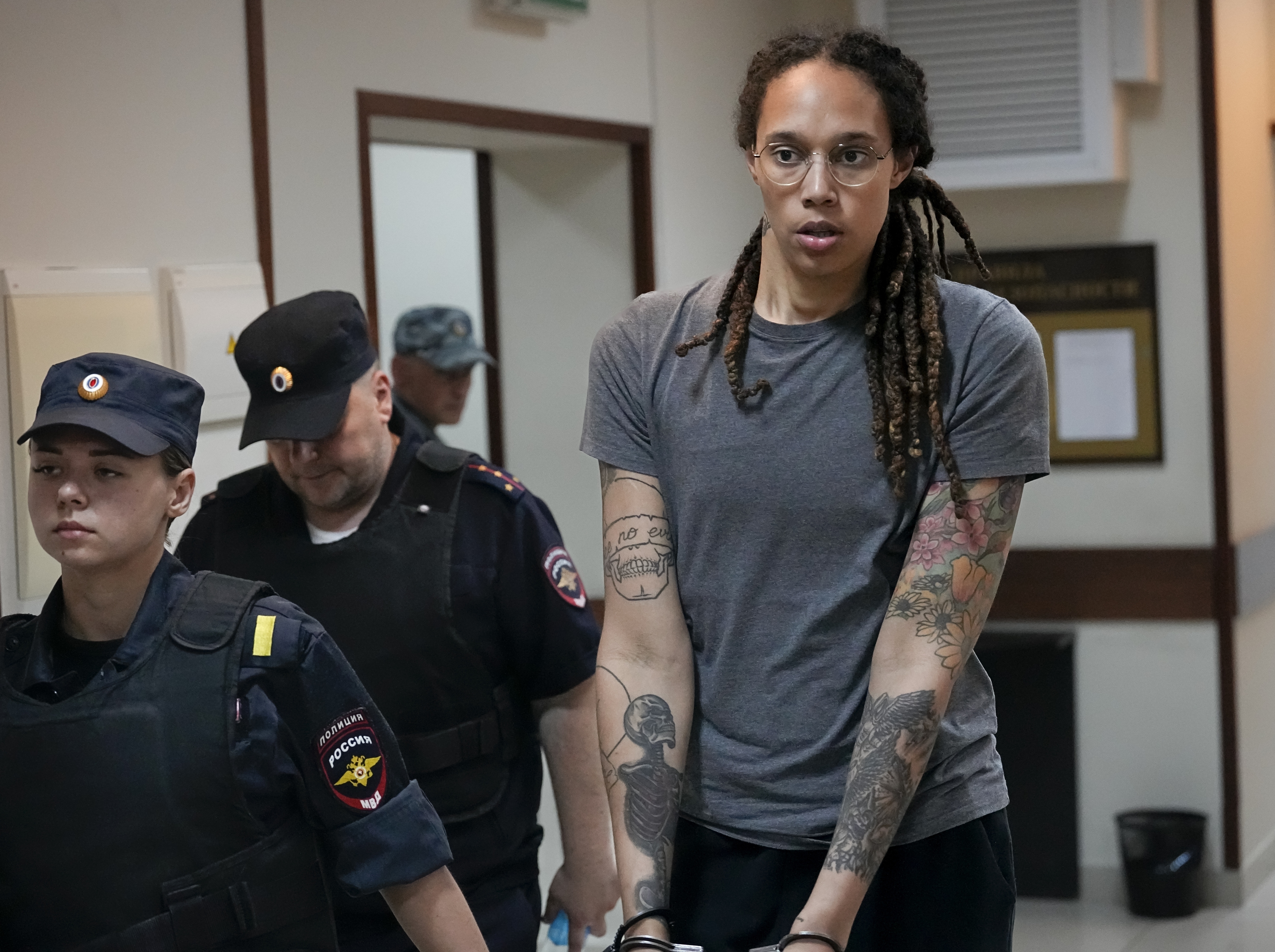
Now that WNBA star Brittney Griner has been convicted of drug possession and sentenced to nine years in prison, attention turns to the prospect of a prisoner swap between the United States and Russia that could get her home.
Secretary of State Antony Blinken went public with that possibility last week, revealing in an unusual announcement that the U.S. had made a “substantial proposal” aimed at securing the release of Griner and another jailed American, Paul Whelan.
With her court case concluded and her sentence pronounced, such a deal — assuming one can be reached with the Russians — is Griner's best chance of being freed early.
Though the guilty verdict was seen as a foregone conclusion, the imposition of a sentence her lawyers decried as far longer than average could give the U.S. extra impetus to strike a deal palatable to Russia as soon as possible. And the formal end of the court case could be the opening both sides need to forge a diplomatic resolution, too.
A look at what's at stake:
WHAT DID THE U.S. OFFER?
Get Tri-state area news delivered to your inbox.> Sign up for NBC New York's News Headlines newsletter.
Blinken did not specify the terms other than to describe the offer as substantial and something that he intended to discuss with Russian Foreign Minister Sergey Lavrov.
A person familiar with the situation said that the U.S. offered to release Viktor Bout, a convicted Russian arms dealer serving a 25-year prison sentence on charges that he conspired to sell tens of millions of dollars in weapons to the Revolutionary Armed Forces of Colombia — an organization classified by Washington as a narco-terrorist group.
The officials did wind up speaking by phone last Friday, the highest-level known contact between the two sides since Russia invaded Ukraine. The two are also in Cambodia for meetings involving foreign ministers of Southeast Asian countries.
WHAT HAS BEEN THE RUSSIAN RESPONSE?
Minimal, at least in public. Blinken did not provide details after his call with Lavrov about his response. The Russians, for their part, gave no hint about their interest in the offer, other than a statement chiding the U.S. to pursue the Americans’ freedom through “quiet diplomacy, without releases of speculative information.”
On Monday, White House Press Secretary Karine Jean-Pierre said the Russian government had responded in a “bad faith” manner with an offer that U.S. officials did not regard as serious. She did not elaborate, though CNN reported last week that the Kremlin also wanted the release a former colonel from one of its spy agencies who was convicted of murder in Germany last year.
WOULD THERE BE A PRECEDENT FOR A PRISONER SWAP?
In many ways, yes — and a recent one too. In April, Russia traded Marine veteran Trevor Reed, convicted of a physical altercation with police in Moscow, for Konstantin Yarosheknko, a Russian pilot imprisoned for a cocaine trafficking conspiracy.
But that involved a Russian with far less notoriety than Bout, a former Soviet air force officer who once inspired a Hollywood movie and who earned the nickname the “Merchant of Death” over allegations that he supplied weapons used for civil wars in countries around the globe. He has adamantly maintained his innocence.
And there's not much recent precedent, at least by the U.S. government, for public discussions of prisoner swaps until after the deal is done and planes are in the air. That's what made Blinken's announcement from the State Department briefing room all the more striking.
On one hand, it seemed intended to communicate to the American public that the administration will do whatever it needs to do to bring home wrongfully detained Americans.
But such a public overture also risks weakening the administration's negotiating hand to the extent it makes the U.S. look overly desperate for a deal, or that it signals to other countries that it is willing to meet potentially unreasonable demands.
More Brittney Griner Coverage
SO WILL THE DEAL TAKE PLACE?
It's hard to say, but the contact between Blinken and Lavrov does suggest more progress than has ever been made before and reinforces the idea that the two countries are willing to maintain communication at a time of extraordinary tensions related to Moscow's invasion of Ukraine.
Griner is the most prominent American detained by a foreign country. She is a two-time Olympic gold medalist detained since February when police said they found vape cartridges containing cannabis oil in her luggage at an airport in Moscow.
And though some Republicans including former President Donald Trump have come out against a deal, the conviction and sentence will only ramp up pressure on the administration to reach an agreement that can get her out soon.
“Today’s sentencing of Brittney Griner was severe by Russian legal standards and goes to prove what we have known all along, that Brittney is being used as a political pawn,” tweeted Lindsay Kagawa Colas, Griner's agent.
She said getting a deal done for Griner and Whelan, a Michigan corporate security executive imprisoned on an espionage conviction he and his family says is baseless, may be difficult but it is “urgent” and the “right thing to do.” The U.S. government also regards Whelan as wrongfully convicted. It seems unlikely the administration would agree to a swap that didn't also include him.
For their part, Russian authorities have suggested that they regarded a conviction as basically a prerequisite for a prisoner swap.
On Thursday, President Joe Biden again urged Russia to release Griner immediately.
“My administration will continue to work tirelessly and pursue every possible avenue to bring Brittney and Paul Whelan home safely as soon as possible,” he said in a statement.
___
Follow Eric Tucker on Twitter at http://www.twitter.com/etuckerAP



